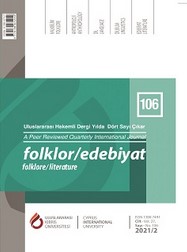“Mâni’u’n-Nukûş” ve Klâsik Türk Şiirinde Duvar Yazısı: “Âh Şâhum”
“Mâni’u’n-Nukûş” and Wall Writing in Classical Turkish Poetry: “Âh Şâhum”
Author(s): Mustafa Uğur KaradenizSubject(s): Visual Arts, Studies of Literature, Turkish Literature
Published by: Uluslararası Kıbrıs Üniversitesi
Keywords: classical Turkish poetry; graffiti; “mâni’u’n-nukûş”; “âh şâhum”;
Summary/Abstract: Walls have transformed into a form of communication through which the distressed and the protestors conveyed their messages. In order to prevent graffiti, foundations have some staff called “mâni’u’n-nukûş”, which are appointed with a special allocation from their budget. It’s known that also the lovers may express their sentiments through graffiti in Turkish classical poetry. The prevalence of this action of the lovers, who write on the walls with various colors, can be understood from the formation of jargon related to the graffiti. In this sense, it’s been observed that graffiti has become the subject of many poems. While some verses can be written on the walls, some graffiti at times can be seen at some verses. It is known that lovers or sufferers write poems or other sentences expressing their longing, love and longing, pain and troubles on the walls of accommodation places such as inns, caravansaries or mosques, baths, and imaret. The lovers in trouble have found an exclamation to express their love and all their feelings to their lovers in the most concise way: “âh şâhum”. In this work, which aims to show a life-facing aspect of classical Turkish poetry and to give place to the sound of the street based on this poetry tradition, the reflections of graffiti in poetry were tried to be considered. The reasons for writing on the wall were discussed. When the sample texts are examined, the conclusion is that graffiti is common but not considered legitimate. In addition, it is seen that this action is trying to be prevented.
Journal: Folklor/Edebiyat
- Issue Year: 27/2021
- Issue No: 106
- Page Range: 503-515
- Page Count: 13
- Language: Turkish

